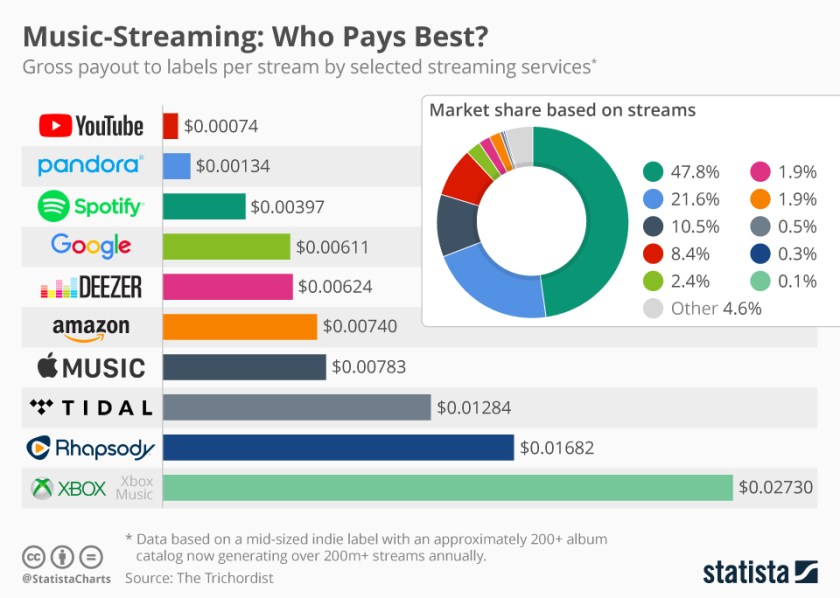Streaming may have saved the recording industry from the loss of CD sales, but it has not helped most musicians earn a basic living.
Recent reports suggest that few copyright- dependent musicians — and really, only a handful of celebrities — make enough money from the streaming services to survive.
“Artists’ complaints about streaming are as old as streaming itself,” writes Ben Sisario in a revealing The New York Times article. “Soon after Spotify arrived in the United States in 2011, musicians began combing through their royalty statements, raising alarms about the fractions of a penny they received for each click.”
Back then, streaming was an unproven model. Now, with Spotify, Apple Music and services from Amazon, Tidal, Deezer and others, it is the dominant mode of consumption. It now comprises 83 percent of recorded music revenues in the United States. Spotify, which has 356 million users worldwide, including 158 million paying subscribers, paid out more than $5 billion to music rights holders in 2020.
Can’t Make Rent
But with all of that use, reports Bloomberg BusinessWeek, Spotify is still only paying an average royalty rate of 0.0038 cents per stream — that’s $3,800 per one million streams. Drummer for the influential alt rock band Galaxie 500, Damon Krukowski, says that that is not saving the music industry and is killing artists.
 Singer-songwriter Nadine Shah previously revealed that she has trouble making rent despite boasting over 100,000 monthly listeners on Spotify.
Singer-songwriter Nadine Shah previously revealed that she has trouble making rent despite boasting over 100,000 monthly listeners on Spotify.
Celebrities like Taylor Swift and those acts with leverage are in a position to cut royalty deals much better than standard royalty rates.
Apple pays an average royalty rate of penny per stream, about two and a half times as much. A modestly successful artist or act with day 50,000 streams of a song would receive approximately $190 from Spotify, perhaps $500 from Apple.
The impact of streaming and digital access on creators has been earth-shifting. Just who is benefiting most from the Internet today is looking narrower and more confusing than a decade ago.
YouTube and the streaming sites provide more potential exposure for musicians, song writers and other content providers, but they do not provide the support and in some cases commitment that the record labels once did. With the pandemic stopping live performances the best known artists with the biggest following have benefitted the most from streaming, leaving less popular and niche acts far behind.
97% of Spotify’s 6 million artist profiles failed to generate $1,000.
Royalty Plans Differ
At the heart of the matter, some argue, is how streaming revenues are shared. Last month, reports the Times, SoundCloud moved some artists to a user-centric royalty plan — an alternative to pro rata accounting that some in the industry, including many artist groups, see as a fairer and more transparent system.
97% of Spotify’s 6 million artist profiles failed to generate $1,000.
“Instead of dumping all the money from users into a single pot, the user-centric model segregates what each user contributes and then distributes that money based only on what that person listens to.”
Proponents say this model pays out streaming income more equitably, helping smaller acts. For example, a fan who listens only to jazz would see their money go only to jazz artists, not to pop stars.
When SoundCloud announced its change, it highlighted some independent artists whose monthly payouts, it said, would increase by as much as five times.
The British government in October unveiled a formal investigation into streaming royalties, reports Digital Music News. The probe aims specifically to determine “whether the business models used by major streaming platforms are fair to the writers and performers who provide the material,” according to DCMS Committee Chair and MP for Solihull Julian Knight.
‘Equitable Remuneration’
Since then, UK-based acts including The Charlatans’ Tim Burgess, Led Zeppelin founder and guitarist Jimmy Page, and “Cars” singer, songwriter, and producer Gary Numan have publicly taken aim at streaming royalties – or the lack thereof. And earlier this week, SoundCloud officially introduced “fan-powered royalties,” or direct-to-artist compensation based upon actual user engagement.
Sir Paul McCartney also has been a supporter of better streaming compensation for artists. ‘Equitable remuneration’ was the term used in a recent letter to British Prime Minister Boris Johnson.
*****
The Guardian reported on June 7th that McCartney, and Jimmy Page of Led Zeppelin have been joined by the Rolling Stones, Tom Jones, Kate Bush, Barry Gibb and dozens of other headliners in a campaign for better remuneration from companies such as Spotify, and creation of an industry regulator.
They are among the new signatories of a letter to Boris Johnson pleading for better remuneration for artists and songwriters.
Image source: statista.com

